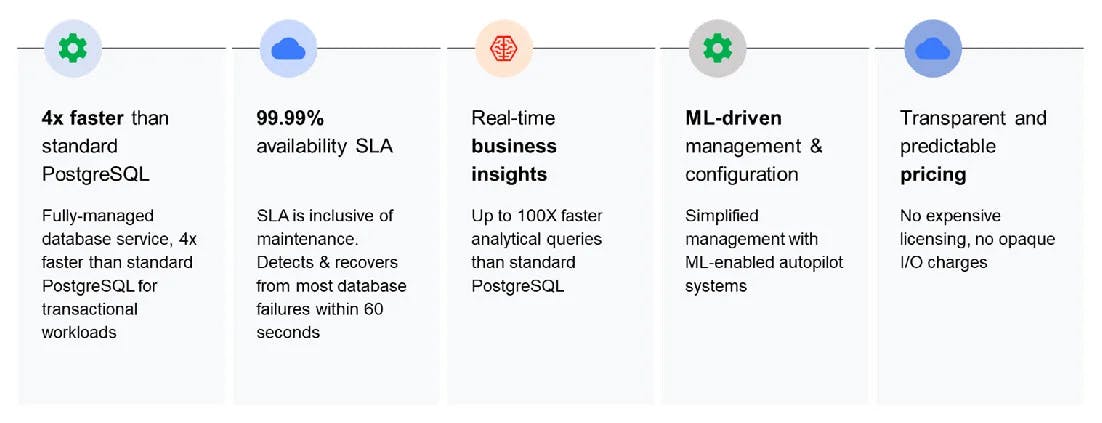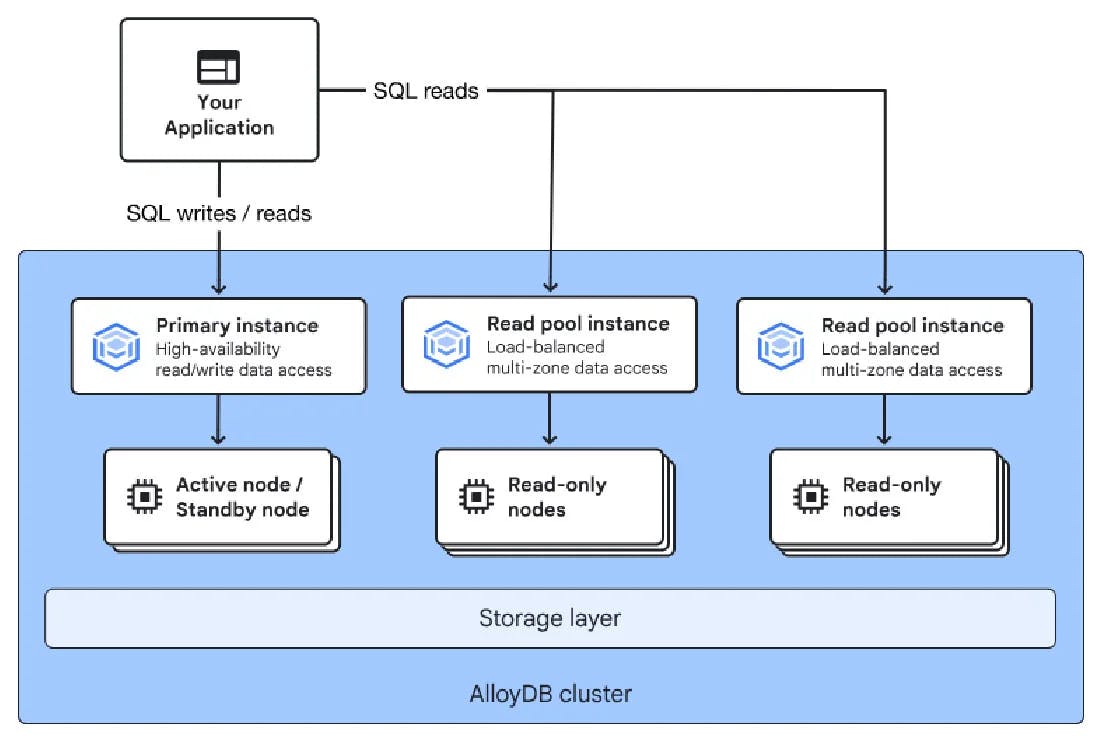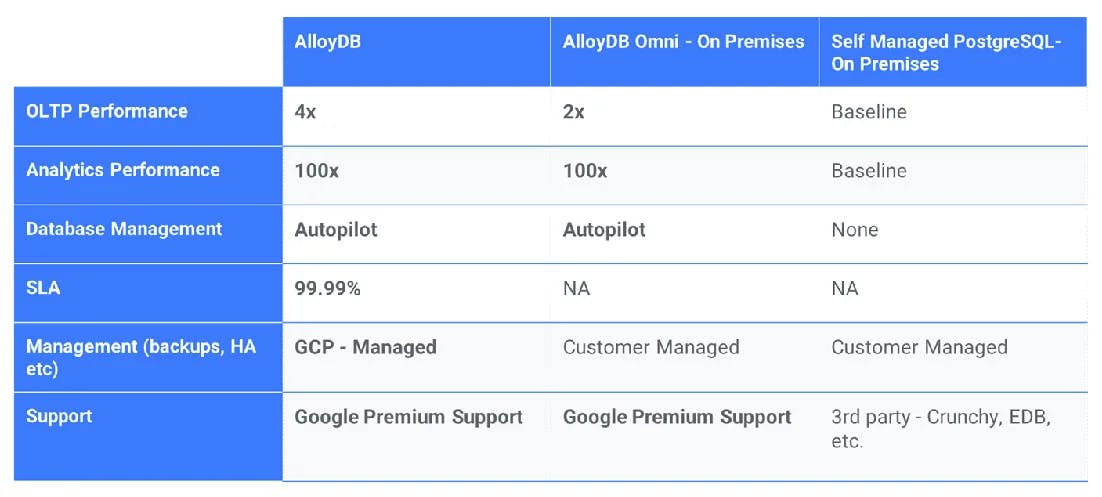Introduction
Real-time insights are crucial for making informed business decisions across enterprises. Alloy DB Omni’s advanced analytics capabilities enable you to gain valuable insights from your data in real time, empowering you to make proactive decisions that drive growth and innovation.
AlloyDB Omni is the latest addition to Google Cloud's data cloud portfolio, which includes database management, database systems, database service and, of course, Google Cloud Console. With its unique capabilities, it offers a multitude of benefits that empower you to modernize your applications and build new ones in a CloudSMART manner.
AlloyDB is a new DBaaS (Database as a Service), fully managed, PostgreSQL-compatible database designed for demanding transactional and analytical workloads. AlloyDB is much faster on GCP than standard PostgreSQL databases in terms of scale-out storage and computing, intelligent caching and AI/ML-powered management. It delivers unmatched price performance compared to PostgreSQL compatible databases in delivering performance tests: almost 4x faster on transactional workloads and up to 100x faster on analytical queries at simple and predictable pricing. Specially designed for mission-critical applications, AlloyDB offers extensive data protection and an industry-leading 99.99% availability SLA — inclusive of maintenance. It’s an optimized version of PostgreSQL customized by Google per customer needs. AlloyDB Omni is a bundled (open-source compatible relational database engine for top-tier workloads) downloadable version of AlloyDB that can be executed on customers’ on-premises data centers or edge locations and across any of the hyperscalers.
Key features and benefits of this database management solution
Additional characteristics of AlloyDB Omni include:
- Detects and recovers from most database failures within 60 seconds
- Simplified management with ML-enabled autopilot systems
- No expensive licensing
- Simple, customer-friendly pricing, without complex licenses or opaque I/O charges
- Hardened and enterprise-ready; extensive data protection features, e.g., point-in-time recovery, backups, customer-managed encryption keys and cross-region replication
- Automatically handles database systems patching, backup, scaling and replication
- Embedded machine learning and autopilot capabilities simplify management
- Ability to scale each one's (primary and read pool) computing capacity individually according to load
- Non-disruptive resizing and maintenance allows always-on read pools and primary to resume normal operations in <10 seconds
- Enhanced analytical insights from in-query integration with Vertex AI

Benefits of AlloyDB Omni over traditional databases (Aurora, Oracle and PostgreSQL DB) and database services
| AlloyDB Omni | Aurora DB | Traditional PostgreSQL | Oracle |
|---|---|---|---|
| Better performance for OLTP workloads | Can achieve only 50% of the performance for OLTP compared to AlloyDB Omni | Can achieve only 25% of the performance for OLTP in compared to AlloyDB Omni | Less performance for OLTP compared to AlloyDB Omni |
| Real-time insights with columnar engine | Lacks similar columnar accelerators | Available with less performance | Hybrid columnar compression with less performance |
| Simpler pricing with a pay-as-you-go model | Costs more than AlloyDB Omni | Lower costs but with limited features | High pricing with heavy licensing for core functionalities |
| Wider HA and DR capabilities, offering 99.99% uptime SLA and auto recovery inclusive of maintenance | Database maintenance impacts HA/DR SLAs | Traditional HA and DR capabilities can be leveraged but mostly require manual intervention | Better HA and DR capabilities but a higher cost |
| Open-source PostgreSQL engine with auto-vacuum and memory management | Open-source MySQL engine with limited features | Open-source PostgreSQL engine does not provide these features | Providing auto-vacuum and memory management requires additional cost |
| Stronger AI/ML capabilities with Vertex AI integration | Limited AI/ML capabilities compared to AlloyDB Omni | Very limited AI/ML capabilities compared to AlloyDB Omni | Additional cost for AI/ML capabilities |
AlloyDB Omni reference architecture

Capability comparison

AlloyDB Omni use cases
AlloyDB Omni is a downloadable database management solution that allows you deploy a streamlined edition of AlloyDB for PostgreSQL in your own computing environment. It is a powerful distributed database that offers several benefits, such as unified data storage, real-time insights, reduced costs, PostgreSQL compatible databases and advanced analytics.
- Multicloud deployments: AlloyDB Omni moves away from the restriction of deploying AlloyDB only in a GCP environment, and it allows clients to deploy and manage databases successfully across multiple cloud platforms, enabling hybrid cloud deployments. This means businesses can leverage the benefits of public and private clouds, depending on their requirements, without compromising data management capabilities.
- Disaster recovery and high availability: AlloyDB Omni is built in Google Cloud with a PostgreSQL engine so it can support native HADR features. For deployments requiring PostgreSQL HADR capabilities, we can leverage AlloyDB Omni, providing Postgres built-in logical replication, which can be leveraged for disaster recovery and high availability. This ensures that businesses can achieve robust data protection and minimize downtime in case of any outages or failures, allowing them to replicate databases across multiple regions.
- Data analytics and machine learning: AlloyDB Omni can be integrated with other Google Cloud services, such as BigQuery leveraging data stream, cloud functions, Google Compute Engine, Google Cloud Console and Dataflow via JDBC driver, allowing businesses to build and deploy powerful data-driven applications and machine learning models. This allows businesses to leverage advanced data analytics and machine learning capabilities. With its unified data management experience across multiple cloud platforms, businesses can easily access and analyze data from different sources, gaining valuable insights and making informed decisions.
- Adapting open-source engines: In case of customers ready to adopt open-source engines and move away from expensive Oracle Vendor Lock-ins, AlloyDB Omni is always a better choice considering its wide range of features ranging from flexibility of clouds, scalability, achieving HADR capabilities and more.
- Superior performance: In the case of achieving better performance as compared to traditional Oracle and PostgreSQL databases, AlloyDB Omni can provide more than 2x faster performance for transactional workloads.
Conclusion
AlloyDB Omni is an innovation in the world of databases, with many considering it a game-changer providing unmatched performance, scalability and security in a hybrid-cloud environment. It provides seamless data distribution and global data management capabilities and integrates easily with other Google Cloud services. Opening a world of possibilities for businesses looking to leverage the power of cloud-native, multicloud database management, AlloyDB Omni empowers them to take their data management to the next level of innovation. As heavy data generation increases, AlloyDB Omni provides a future-proof and scalable solution to meet its growing database management needs on the Google Cloud Platform.
Finally, the synergy between Google Cloud's Data Cloud portfolio and AlloyDB Omni is undeniable. Together, they provide a comprehensive and powerful suite of tools that enable you to achieve agility in your application development process. From seamless integration to enhanced performance, AlloyDB Omni and Google Cloud's Data Cloud portfolio are better together.




